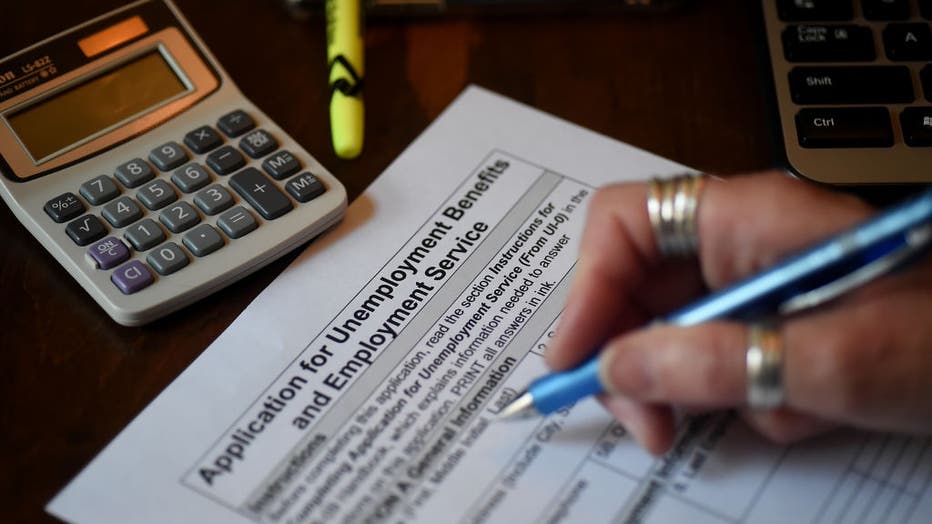Whitmer signs bills extending unemployment benefits until end of year
LANSING, Mich. (FOX 2) - Governor Gretchen Whitmer signed two new Senate bills to extend unemployment benefits for Michiganders who have lost work from the COVID-19 pandemic from 20 to 26 weeks until the end of the year.
Senate Bills 886 and 991 expand the unemployment benefits. Since March 15, Governor Whitmer’s administration has paid over $25 billion in benefits to 2.2 million workers, according to the state.

In this photo illustration, a person files an application for unemployment benefits on April 16, 2020, in Arlington, Virginia. (Photo by OLIVIER DOULIERY/AFP via Getty Images)
“No Michigander should have to worry about how to put food on the table or pay their bills, especially during a global pandemic,” said Whitmer in a release. “These bipartisan bills are an important step in providing immediate relief for working families, but given the recent rise in COVID-19 cases and hospitalizations in Michigan, I urge the legislature to take further action to make this permanent. 40 states, including all of our neighbors, automatically provide at least 26 weeks of unemployment relief.
"Michiganders deserve better than a short-term extension that expires at the end of the year. It’s time to work together on a long-term solution for working families.”
While the bills signed today fulfill the majority of the governor’s executive orders on unemployment, the legislature failed to extend the governor’s efforts to speed up claim processing by allowing UIA to review only a claimant’s most recent employer separation. UIA must now evaluate every job a worker has left in the past 18 months.
“When we get back to session I look forward to taking up our bills to expand unemployment benefits and create stronger pathways to get Michigan families the resources they need during a pandemic,” said Rep. Darrin Camilleri (D-Brownstown).
"Michigan's working people are grateful to the legislature for taking action to patch some of the holes in our state's safety net that were ripped open weeks ago by a narrow Supreme Court decision," said Ron Bieber, President of the Michigan AFL-CIO. "But this virus isn't going to disappear just because we are tired of it, and it certainly won't be doing so on or around December 31st. Leadership should call them back from their extended vacation - after making the fixes to unemployment insurance permanent, they still have plenty of work to do to keep people safe and healthy, and address the economic devastation still rippling from our national failure to effectively deal with the virus."
One of the first actions Governor Whitmer took during the pandemic was to expand eligibility for unemployment benefits to workers who have an unanticipated family care responsibility, workers who are sick, quarantined, or immunocompromised, and first responders who become ill or are quarantined due to exposure to COVID-19.

Under Whitmer, Michigan was one of the first states to begin issuing the additional $600 pandemic benefit from the U.S. government.

